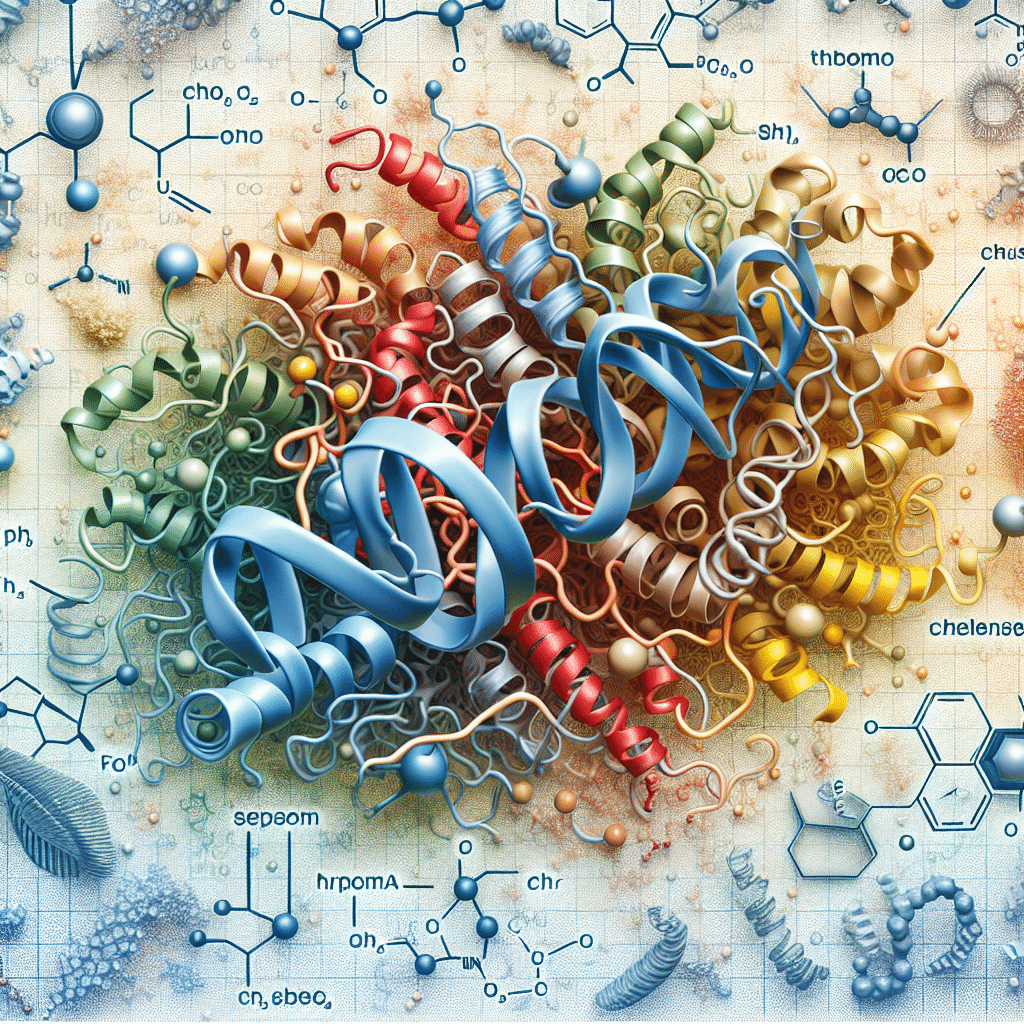Squalene Monooxygenase: What Is It?
-
Table of Contents
- Squalene Monooxygenase: Exploring Its Critical Role in Cholesterol Synthesis
- Understanding Squalene Monooxygenase
- The Role in Cholesterol Synthesis
- Regulation of Squalene Monooxygenase
- Implications in Health and Disease
- Cardiovascular Diseases
- Metabolic Disorders
- Research and Therapeutic Potential
- Drug Development
- Genetic Studies
- Case Studies and Statistics
- Statins and Squalene Monooxygenase
- Conclusion: Key Takeaways on Squalene Monooxygenase
- Discover High-Quality Proteins with ETprotein
Squalene Monooxygenase: Exploring Its Critical Role in Cholesterol Synthesis

Cholesterol is a vital component of cell membranes and a precursor for the synthesis of steroid hormones, bile acids, and vitamin D. Its synthesis is a complex process involving multiple enzymes, with squalene monooxygenase playing a pivotal role. This article delves into the function, importance, and implications of squalene monooxygenase in human health and disease.
Understanding Squalene Monooxygenase
Squalene monooxygenase, also known as squalene epoxidase, is an enzyme that catalyzes a crucial step in the biosynthesis of cholesterol. It is responsible for the conversion of squalene into 2,3-oxidosqualene, a key intermediate in the cholesterol synthesis pathway. This enzyme is located in the endoplasmic reticulum of liver cells and other tissues involved in cholesterol production.
The Role in Cholesterol Synthesis
The synthesis of cholesterol is a multi-step process that begins with the conversion of acetyl-CoA to HMG-CoA, followed by its reduction to mevalonate. Several enzymatic steps later, the pathway leads to the production of squalene, which is then transformed by squalene monooxygenase into 2,3-oxidosqualene. This step is considered rate-limiting, meaning it can control the overall pace of cholesterol synthesis.
Regulation of Squalene Monooxygenase
The activity of squalene monooxygenase is tightly regulated by various mechanisms, including feedback inhibition by cholesterol and its derivatives. Additionally, the enzyme is subject to post-translational modifications and proteolytic degradation, which can further fine-tune its activity in response to cellular cholesterol levels.
Implications in Health and Disease
Given its central role in cholesterol synthesis, squalene monooxygenase has significant implications for human health. Abnormalities in its function or regulation can lead to various health issues, including cardiovascular diseases and metabolic disorders.
Cardiovascular Diseases
Excessive cholesterol accumulation in the arteries is a major risk factor for atherosclerosis and subsequent cardiovascular diseases. Since squalene monooxygenase is a key regulator of cholesterol synthesis, its activity can influence cholesterol levels in the body. Inhibitors of this enzyme are being explored as potential therapeutic agents to lower cholesterol and reduce cardiovascular risk.
Metabolic Disorders
Metabolic disorders such as obesity and diabetes can also be linked to dysregulation of cholesterol synthesis. Research suggests that alterations in squalene monooxygenase activity may contribute to the metabolic changes observed in these conditions.
Research and Therapeutic Potential
Understanding the function and regulation of squalene monooxygenase has opened new avenues for research and therapeutic intervention. By targeting this enzyme, scientists aim to develop drugs that can effectively manage cholesterol levels and treat related diseases.
Drug Development
Several compounds that inhibit squalene monooxygenase are currently under investigation. These inhibitors could serve as alternatives or adjuncts to statins, the current standard of care for lowering cholesterol.
Genetic Studies
Genetic studies have identified mutations in the gene encoding squalene monooxygenase that can affect its activity. These findings provide insights into the genetic basis of cholesterol-related disorders and may lead to personalized treatment strategies.
Case Studies and Statistics
Research has highlighted the importance of squalene monooxygenase in health and disease. For instance, studies have shown that individuals with certain genetic variants of the enzyme have altered cholesterol levels, which may affect their risk of heart disease.
Statins and Squalene Monooxygenase
Statins, while primarily targeting another enzyme in the cholesterol synthesis pathway (HMG-CoA reductase), also affect squalene monooxygenase indirectly. The interplay between these enzymes is crucial for the overall efficacy of statin therapy.
Conclusion: Key Takeaways on Squalene Monooxygenase
Squalene monooxygenase is a vital enzyme in cholesterol synthesis, with significant implications for human health. Its regulation is complex, involving feedback mechanisms and post-translational modifications. Aberrations in its activity can lead to cardiovascular diseases and metabolic disorders. Research into squalene monooxygenase inhibitors offers promising therapeutic potential for managing cholesterol levels and treating related conditions.
Discover High-Quality Proteins with ETprotein
If you’re in the market for premium protein products, ETprotein is your go-to source. With a wide range of organic and vegan protein options, ETprotein caters to various industries, including nutraceuticals, pharmaceuticals, and food and beverage. Their commitment to quality, non-GMO, and allergen-free products ensures that you receive the best ingredients for your needs. Explore ETprotein’s offerings and take advantage of their expertise in protein manufacturing and supply.
About ETprotein:
ETprotein, a reputable protein and L-(+)-Ergothioneine (EGT) Chinese factory manufacturer and supplier, is renowned for producing, stocking, exporting, and delivering the highest quality organic bulk vegan proteins and L-(+)-Ergothioneine. They include Organic rice protein, clear rice protein, pea protein, clear pea protein, watermelon seed protein, pumpkin seed protein, sunflower seed protein, mung bean protein, peanut protein, and L-(+)-Ergothioneine EGT Pharmaceutical grade, L-(+)-Ergothioneine EGT food grade, L-(+)-Ergothioneine EGT cosmetic grade, L-(+)-Ergothioneine EGT reference grade and L-(+)-Ergothioneine EGT standard. Their offerings, characterized by a neutral taste, non-GMO, allergen-free attributes, with L-(+)-Ergothioneine purity over 98%, 99%, cater to a diverse range of industries. They serve nutraceutical, pharmaceutical, cosmeceutical, veterinary, as well as food and beverage finished product distributors, traders, and manufacturers across Europe, USA, Canada, Australia, Thailand, Japan, Korea, Brazil, and Chile, among others.
ETprotein specialization includes exporting and delivering tailor-made protein powder and finished nutritional supplements. Their extensive product range covers sectors like Food and Beverage, Sports Nutrition, Weight Management, Dietary Supplements, Health and Wellness Products, and Infant Formula, ensuring comprehensive solutions to meet all your protein needs.
As a trusted company by leading global food and beverage brands and Fortune 500 companies, ETprotein reinforces China’s reputation in the global arena. For more information or to sample their products, please contact them and email sales(at)ETprotein.com today.












